
Murder He Wrote.
After an injury related leave of absence, veteran detective Jiang Guangming teams up with rookie Shi Luo to tie up a few perplexing loose ends in a murder case. Shi Luo is a crime fiction junkie and notices that the crime scene is disturbingly similar to one described in Gu Jiming's debut hit novel Black Rain. Is it a bizarre Murder He Wrote type of coincidence or is the author somehow complicit? The plot thickens when they discover Gu Jiming is not the only writer with links to the victim or the crime scene. The list of suspects grows as they delve deeper into the incestuous and cut throat literary world of aspiring and established writers and their messy personal lives.The murder mystery is riveting from the onset as the search for a missing dog becomes a hunt for a missing witness. As they hone in on the main antagonist, the narrative morphs into a police procedural and a terrifying, gut wrenching exploration of man's quest for relevance. For Zhenzhen and Guangming it is about being in control; for Jiming and Tang Xun it was about writing that memorable first and last novel. All too easily, they slip down the path of moral decay in their pursuit of what matters to them. Even though I was fascinated by this dark and cynical treatise on human nature and how toxic relationships can get, I didn't like or root for any of the characters in this story.
I always regarded Tong Dawei as an overrated actor but I was floored by his compelling portrayal of the pitiful, conflicted and ultimately selfish character that is Gu Jiming. I also was surprised by his dark chemistry with Su Zhenzhen and how they fed off each other. While I appreciate the attempt to flesh out Guangming's character and to somehow connect her marital problems to the case, I was bored by her relationship arc. Despite Ma Yili's fantastic acting, the great cop terrible wife plot-line is unoriginal and went on for too long; often disrupting the flow and pacing of the main narrative. The final two episodes are quite anti-climatic but its still overall an excellent suspense thriller. This could have been a much tighter and more engrossing watch had they cut it down to 10-12 episodes. I rate this an excellent 8.0/10.0.
Esta resenha foi útil para você?
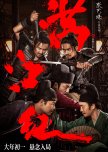
We will feast on the enemies flesh and drink their blood.
Full River Red is an ancient dark comedy whodunit set in Song dynasty. It is Zhang Yimou's most commercially successful movie to date That is no reason to dislike it. For Zhang Yimou never fails to stun with the sheer brilliance of his cinematic vision and his ability to provoke and capture profound human emotions. It is his narrative style that tends to be weighed down by illogical, at times exaggerated plot points and inconsistent characterisations that rarely does justice to his incisive camera language. While there are traces of these habits, this twisty, stab-happy mystery is the tightest plot I have seen from him in years.As much as the critical political and societal undertones of Zhang's earlier works discomfited the Chinese government, his recent works are now accused of pandering to government propaganda. Every Western film critic has remarked upon the movie's jingoist note with a sense of unease. The Chinese title Mǎnjiānghóng/满江红 or crimson river sets the tone from the start. This eponymous poem attributed to patriot Yue Fei is ubiquitous; it spoke to me even before I could understand its prose. People's hero Yue Fei was a revered Song general who relentlessly defended his homeland against the invading Jurchens. He was betrayed by the enemy within, a jianchen/奸臣 treacherous official Qin Hui who goes on to be prime minister. What happened to Yue Fei is one of history's terrible injustices, one that still resonates eight hundred years later. The common people appeased their deep sense of sorrow and thirst for justice by deep frying dough sticks in oil yóu zhá guǐ/油炸鬼 or deep fried guǐ/ 鬼 or devil, which in Cantonese is a homonym for Hui/Kuai/桧 in Qin Hui. When I was a kid, my dad used to rant about the dastardly Qin Hui every time we bit into his favorite crispy fried dough sticks.
The movie opens four years after the unjust death of Yue Fei. A Jin envoy is murdered on the eve of his meeting with Prime Minister Qin Hui. The important missive he carried is missing. The unfortunate night patrol is put under the knife as heads must roll for this diplomatic disaster. Desperate to buy time, corporal Zhang Da convinces Deputy Commander Sun Jun that he may be of value in solving the case. They make some small progress and are given two hours by Qin Hui himself to recover the missing missive. Thus begins a high-strung, knives drawn chase through the serpentine military compound as they question unreliable witnesses and fend off duplicitous officials vying to get their nefarious hands on the missing letter.
In a departure from Zhang Yimou's signature, bombastic color drenched cinematic style, the palette is muted, somber and haunting in its clean lines and simple, gorgeous grey toned soberness. There is a sense of profound gravitas that overhangs the thrill and suspense of unraveling the conspiracy at hand. The pacing is start stop as the narrative slows down enough to allow important plot points to soak in only to pick up again to the tune of a clattering amalgamation of hip-hop and Chinese folk music as they race through the complex to pin down the next clue. The body-count piles up as suspects are dispatched suddenly and brutally with dark humor that is as sharp as the knife play. I won't spoil the ending other than to say it is wildly, enormously satisfying and yet it still respects history.
In terms of the cast, it really doesn't get better than this. I was surprised by Shen Teng and Jackson Yi's chemistry and how humorously they convey just the right mix of conflict, mistrust and empathy. I must applaud both Lei Jiayin and Zhang Yi for taking on roles outside their comfort zone. I could see that Lei Jiayin absolutely relished playing the vilest most hated villain in Chinese history. While far from the monster of my childhood imagination, his Qin Hui is still a wicked, cunning creature but also realistic, mortal and even almost human. To me, the memorable highlight of the drama was to watch one of China's very best actors recite the titular poem. Yes it is a very patriotic poem but its message is universal - everyone loves their country for better or worse and will defend it with every ounce of their being. This is the one time that Zhang Yimou's famous digressions is actually fitting and gives a deeper meaning to the story. The movie's big message is also universal; that there are some truths that must be revealed at whatever cost.
This movie hits all the right buttons for me - a dark comedy conspiracy thriller with a touch of wild history around characters that set my imagination and sense of right and wrong afire as a child. It smacks of Zhang Yimou's hallmark provocative brilliance with small flaws and is one of the rare times I enjoyed his storytelling almost as much as his visual composition style. This is an 8.5/10.0 for me.
Full River Red (follows the toned down movie translation):
My last words reflect my thoughts
Full river red
My hair bristles with anger
I lean against the rail
The rain has stopped
Looking at the sky
I let out a cry
Emotions well up in my chest
My achievements in the past are merely dust
I fought bravely with the clouds and the moon
Don't wait
When your hair turns grey you can only regret
The national shame has not been avenged
When can my hatred be wiped away
Riding war chariots we will tumble the Helan Mountains
We will feast on the enemies flesh and drink their blood
When we recover our lost lands
We will satisfy people's demands
Esta resenha foi útil para você?

Who Am I?
Sakra is an overly ambitious attempt to adapt Qiao Feng's arc from Demi-Gods and Semi-Devils (天龙八部), my favorite Jin Yong novel. This is a tall task and inevitably has resulted in an overly condensed adaptation that misses the spirit of the original works. It is carried by the fact that it is such a beloved story that most viewers can fill in the gaps.Qiao Feng, the magnetic chief of the Beggar Sect is accused of dastardly crimes and outed as being of Khitan descent at a time of conflict between Song and Liao (Khitan). He is evicted from his sect and the entire wulin (martial world) turns against him. As he seeks to clear his name, he encounters Ahzu, a minion in the powerful Murong household. He risks his life to save hers and discovers that like himself, she is also on a Who Am I? quest to figure out her origins. The narrative takes on too much between the rushed and unconvincing romance, solving murders and disentangling both their back stories. The ending is confusing with hurried character introductions to pave the way for a sequel that deals with the mastermind reveal and final arcs of Qiao Feng's story. This hurried rendition makes Qiao Feng little more than a one dimensional, lean mean fighting machine. It is a pity because Qiao Feng is Jin Yong's most powerful, complex and misunderstood male character.
Qiao Feng is the ultimate master of Jin Yong's epic 18 Dragons Subduing Palm martial arts technique, which employs inner energy and is used in most of Qiao Feng's fight scenes. The action scenes are almost ridiculously bombastic - Qiao Feng pulverising an entire horde of martial arts with his amazing energy blasts; gravity defying roof leaping and up close and lethal hand-to-hand combat or swordplay. Qiao Feng's showdown with the entire wulin is the most thrilling action sequence but it comes a bit too early in the movie. It is both incredulous and stupendous to see one man take on so many. I truly feared for Qiao Feng's life but what was more terrifying was the hypocrisy and cowardice of wulin. They basically cancelled a brother-in-arms who stared down death alongside them multiple times and ganged-up on him to try to kill him! I didn't enjoy the final fight scene as much - while splendidly choreographed and thrilling, it veered too far into the territory of wildly exaggerated almost superpower like flying leaps and from a distance qi energy strikes.
I watched the Cantonese dubbed version because to me, Qiao Feng will always be Kiu Fung and Jin Yong's famous lines always sound so diminished and lacking in vehemence and intensity in Mandarin. I think this is a great watch for the action scenes alone. I rate it 7/10.
Esta resenha foi útil para você?
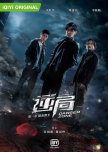
Hard core gore.
This review covers both Season 1 and Season 2 as it does not make sense to review them separately.This is a gripping and fast paced psychological crime thriller that explores the dark side of justice and how the road to perdition is paved with just intentions. In a desperate race against time with few promising leads, Captain Tan's investigative team are under intense pressure to put a stop to a bunch of brutal serial killings. Prison inmate and gifted former profiler and attorney Liang Yandong, is on trial for murder and is convinced that his case is linked to the serial killings. He persuades hungry young rookie cop Ren Fei to share information in the case with him in exchange for his assistance with profiling the serial murderer. The first season solves the first case only to reveal a larger conspiracy that intertwines with a devastating unsolved cold case.
I really enjoyed Vic Zhou's performance as the inscrutable Liang Yandong, especially in the beginning when he teases us with the question of whether his motives are benign. Among the big name cast, his performance pulls the production together as his rapport with each of the main characters seems the most natural. Sandrine Pinna also pleasantly surprised me in her ability to pull off a complex role although some of her scenes in the latter half could have been more nuanced and less forced. Although I like Christopher Lee, his Captain Tan did not really connect with me or with the other members of his investigative team. Part of the problem is that Zhu Tingdian's performance as Ren Fei is hit or miss and his character interacts the most with Captain Tan. His Ren Fei "clicks" with Liang Yandong and Teresa Daley's Ji Siqi but not so much with Captain Tan and the rest of his team. The broader investigative team's dynamics is also not convincing enough to inspire me to root hard for the "good guys" and feel pulled into their mission. To some extent, the cops in this show are dumbed down a little bit too much so that Liang Yandong can look really smart.
The plot overall is fairly tight and it fast paced, full of good twists including a hidden antagonist that reveals themselves a tad on the early side. There are some holes and some suspension of disbelief is needed but it moves so fast and is so action packed you won't have time to dwell too much on on them, which is fantastic. The ultimate villain is known fairly early on and their motives are not that convincing or well explained but there are enough other interesting characters. By pretty much the same team as the highly acclaimed and more memorable Victim's Game, I like this better as a pure suspense thriller for its better focus on a well explored big case that ties everything together and its lack of digression into social issues.
My main problem and reservation with this drama however is that it goes far beyond hard core gore. In general I am fine with dark themes and I don't get triggered that easily but what I found deeply disturbing about this drama is its heavily in your face misogyny. You will be repeatedly treated with gratuitous, extended gore images of women being tortured and mutilated. It is completely unnecessary to the plot or the exploration of the killers' psyches. To give the production the benefit of the doubt, I can tell from The Victim's Game that this team overly delights in showing off their technical prowess at detailed, realistic and almost pornographic gruesome scenes. However I cannot help but be offended and put off by the almost exclusive focus on abusing women and in such loving and repeated detail. So I am really struggling with this review and avoided writing it for quite some time. If they had toned things down (a lot), I would be tempted to give this an 8.0/8.5 but my anger at the extreme misogyny makes me think 6.0/6.5. I am just going to make life easy for myself and call this a 7.0 while acknowledging that is maybe a bit unfair. If you can get past the hard core gore, this is a very enjoyable thriller for fans of the genre.
Esta resenha foi útil para você?

You only live twice.
Fan Xian is back!!! There are no words to describe the pure joy I felt after what was for me, a three year wait. I never expected S2 to be as strong as S1 and as much as I enjoyed it, it is not quite at the same level. To begin with, killing a character onscreen is never easy to unwind and their walk back of the S1 cliffhanger was long winded, cumbersome and comically farcical. What saves it is that most audiences are so grateful to see the whole gang, villains and all, back together again they willingly suspend disbelief.The most noticeable difference with S2 is the visible shift in the narrative from plot driven to largely character driven. After narrowly cheating death, an introspective Fan Xian who realizes you only live twice, returns to the capital. During S1, Teng Zijing showed Fan Xian that some things are worth dying to protect. This season explores what those things are for Fan Xian. He reflects upon his mother's ideals and begins to see the injustices that made her want to change the world. The plight of the common people resonates with him as he comes to understand that he is also but a pawn in a high powered chess game. He embraces his mother's legacy with a sense of purpose and a clear vision of what he means to do with it. The most exhilarating moments of this season are not action packed or full of intricate twists but pivotal moments in Fan Xian's character journey. It is less exciting if you are an action junkie but this is the season that reveals who Fan Xian really is and more importantly, who he wants to be.
With the signature Joy of Life verve and wit, important plot points or character motives are conveyed indirectly with humor. As the laughter abates, the manifold implications, often dark and diabolical start to sink in. The most chilling aspect of S2 is Fan Xian's complex, multi-dimensional chess game with the emperor, who is the grandmaster firmly in control of the board and all the chess pieces. It is not even clear that Chen Pingping is really on Fan Xian's side; after his "miscalculation", he seems just as dangerous as friend or foe. It is from such a disadvantaged position that Fan Xian plays to win even though winning could also cost him his head. While the emperor's end game remains murky, he reveals a guarded, almost resentful affection for Fan Xian that has me hopeful and fearful at the same time. Some of the emperor's schemes and motives are too intricate and have to be explained via dialogue, which is something I am not a fan of.
Inasmuch as I quite miss the rounder and carefree Fan Xian, Zhang Ruoyun's lean and mean new look lends a sense of maturity and gravitas to the role. My mouth goes dry at the layer upon layer of divine masculinity that comprise Fan Xian, the man. His scenes with the emperor where they both test and measure each other are mesmerising until the tension is broken by at times offbeat humor that has me yodelling with laughter. Every dysfunctional Li family gathering is a hilarious parody of a feast at Swan Goose Gate (Hongmen banquet/鸿门宴). There are many insanely well acted emperors in c-drama yet Chen Daoming still manages to stand out with his complex, differentiated, infuriating and utterly unpredictable portrayal. Just when I am sure I loathe him, he blindsides me with an unexpectedly moving expression of almost regret. Fan Xian has yet to get the better of this sociopath but at least he still manages to run circles around "Mini Me". The moment he scared the living daylights out of the second prince is one of the highlights of the season.
It is no small feat that they managed to reunite such a large and sought after cast and practically all the roles are well conveyed. Ye Lingér however was obviously abducted by aliens and replaced with a bot. Hopefully Si Lili rescues her offscreen and returns with the real Ye Lingér just in time for S3. I won't deny that I basked in every moment of this reunion of my favorite characters, good and evil. That said, outside of Fan Sizhe, no one really gets to do anything consequential. Many new characters including the first prince, the Beiqi princess and Fan Xian's scholars are introduced with unclear purpose. Everyone is being teed up but the punchline is put on hold until S3. This unbalanced focus on introducing and fleshing out characters and relationships comes at the cost of plot movement. This makes me worry that this leaves too many open plot arcs to be closed in S3. While I wouldn't dare to explicitly wish anyone's bestie villain dead, I think they should have closed at least one of the villain arcs instead of pushing everything into S3.
The character arc of S2 closes triumphantly with Fan Xian reclaiming his power and free will by choosing what family means to him and in doing so, he changes the game. I expect S3 to be once again more plot driven like S1. While I savored S2 and appreciate that they took the time to flesh out the characters and key relationships, there are just too many open plot threads for me to rate this the 9.5 I gave S1. Thus this is a 9.0/10.0 for me for now. If everything comes together well in S3, the series overall will easily be 9.5 or a 10.0.
Esta resenha foi útil para você?

Rebel Without a Cause.
This is one of those magnificent, high budget productions that starts so strongly that I kept shushing that inner voice that whispered "masterpiece" for fear of jinxing it too early. Sixty-eight episodes later, I am sad to say that despite some excellent arcs and moments, this drama falls far short of its breathtaking early promise.*** Be warned that there are mild spoilers in my review - I will avoid major spoilers. ***
Wang Xuan or A'wu, the titular character is a fictional only daughter of Prime Minister Wang Lin, head of the Langya Wang clan whose formidable political influence straddled several early dynasties since Eastern Jin. Their hold onto power is secured via an incestuous (and icky) pact with the imperial Ma family whereby for twelve successive generations, the Wang clan heiress is chosen as empress. Wang Xuan's legacy 王氏之女 母仪天下 literally means the Wang clan daughter is the "mother of the world" or the empress. Thus he who attains Wang Xuan, attains the world. This is not just a prophecy; she comes with the power and influence of the Wang clan who are kingmakers. The drama dumbs this down to be just about lovesick men after her ravishing and incomparable beauty. That is just icing on the cake and not the only aspect of her appeal to ambitious men who cannot otherwise legitimately claim the throne. This is with the exception of the the weak and foolish Zidan, a character who exist only to love A'wu. In this context, A'wu's expectation of a love match is unrealistic and not possible for any of the noble elite; marriages are political alliances where the best one can hope for is some affection that may or may not quite be love.
A'wu's first and most significant act of rebellion is against her destiny as empress and in doing so, she goes against her father and by extension her clan. This upsets the balance of power between the imperial Ma family and the Wang and Xie clans and sets an intense power struggle in motion. While her motives are naive, this is the first of many decisions she makes that undermines her clan's extraordinary grip on power. In fact, she protects the imperial family's birthright without questioning their worthiness. In this matter, she is indeed a rebel but one that lacks a just cause because excessive in-breeding has made each of the Ma heirs some combination of stupid, unfit and unworthy. That said, I saw character growth and could understand and largely empathize with her decisions until the arc that sees her return to the capital with Xiao Qi just past mid-way through the drama. Until then, the plot was well paced, suspenseful and the motives of the main antagonists layered and interesting enough to make this worthy of a 9.5/10.0. Unfortunately the drama peaks there and after that, the plot falls flat and becomes overwhelmed by tropey two dimensional villains with repetitive and boring motives. Wang Xuan's character regresses and she makes very questionable decisions, the worst of which culminates in a very shady mating dance that I cannot un-see no matter how many times I rinse out my eyeballs.
Xiao Qi and Wang Xuan's relationship is the best thing about this drama. Even though he didn't get enough screen time to do his character justice, Zhou Yi Wei 's Xiao Qi stole the show. It is so nice to see an actor looks and fits the part of a battle scarred, undefeated general in the role rather than some scrawny idol actor with baby smooth skin. Much more so than Wang Xuan, Xiao Qi is thecharacter that I really root for in this drama. He has riveting chemistry with Zhang Ziyi that compels me to keep re-watching the way their romance unfolds and progresses. It is freshly written and their natural and intimate interactions manage to avoid common drama relationship cliches. Both actors communicate deep and complex emotions with few words and tiny, nuanced changes in expression. Their relationship is not perfect - they have their share of challenges and conflicts. It is disappointing we don't get to see how they navigate their greatest relationship challenge as Wang Xuan is caught between protecting her first love and Xiao Qi's quest for justice.
What is super annoying is that Zidan could have been written to be a much more interesting character rather than one that is frankly a complete waste of screen time. He got such an absurd amount of time he was constantly popping up like a bad tart when all I wanted to see was Xiao Qi. It is understandable for Wang Xuan to have some lingering regret and affection for him but that is not well flushed out. The fact is she married Xiao Qi to save Zidan and at the end, she still rescues him while turning a blind eye to his crimes. It makes me wonder if he was indeed her one true love after all.
The crux of the problem is that Zhang Ziyi's portrayal of Wang Xuan lacks complexity. Her A'wu stopped becoming interesting the moment she grew up to be the more politically astute Wang Xuan. She becomes a suffocating paragon of virtue and forgiveness 母仪天下; the mother of her country and and inexplicably staunch defender of the (worthless) imperial family's absolute right to rule. She wears a perpetually aloof and haughty expression and does not let anyone forget that she belongs to nobility; that she has familial obligations and ties that a commoner and an orphan such as Xiao Qi could not possibly understand or relate to. While she is entitled to forgive her enemies for wrongs they committed against her personally, it is absolutely not her place to broadly dispense justice as she sees fit. She casually makes decisions of great weight and consequence as without any appearance of inner conflict or overarching ideology or sense of justice. If this makes her a rebel, she is one without a cause. I like Zhang Ziyi but this is not a role that she shines in. Despite not looking the part, I had no issue with her portrayal of the young A'wu. It is her Wang Xuan that ultimately fails me. I abandoned the novel because I disliked how narcissistic the character was written to be there. But in the novel ,at least she is very conscious of her beauty and charisma and wields it ruthlessly to accomplish her goals. I never imagined disliking her hypocrisy and sense of entitlement even more in the drama. It does not help that Zhang Ziyi's portrayal is so humorless she even takes the joy out of getting drunk off her ass. At least Wang Su is a fun and uninhibited lush, the kind of drunkard anyone can relate to.
My favorite character and the one that shores up the drama is Yu He Wei's Wang Lin. He is the only truly complex character that is smart without being infallible, unabashedly ambitious, cynical and unrepentant. I love how he gleefully, insightfully analyses situations and peels away the layers of righteousness and hypocrisy around him. There were many times I could empathize with and even support his cause.His plotting against emperor Ma is the drama's best arc. Wang Xuan is actually remarkably like him in terms of her innate arrogance and sense of entitlement as well as her ability to make bold decisions on important affairs of state. As he exits, she steps into his role as the silent force behind the throne with Xiao Qi as the military power that anchors her influence. She is truly her father's daughter in more ways than would make her comfortable if she could see herself. This does not come across clearly because Zhang Ziyi whitewashes Wang Xuan's character and does not dare to embrace her dark side. Everything comes to a full circle when father and daughter discuss love and marriage and she more or less admits that her relationship with Xiao Qi is not too dissimilar to that of Wang Lin's with her mother. It is convenient that she loves him but their marriage serves a purpose that is far grander and more encompassing than love.
While the ending is acceptable, it is in too many important aspects disappointing. Given that regime change is not a viable way to end this kind of drama, it should not have been written to make such a compelling case for it. ZIdan did not have to have been written to be such a jidan (鸡蛋) or a zero. It is obvious many important parts of the ending episodes were edited out which is such a sloppy thing to do when they could have substantially edited down the most insipid Wang Qian/Helan Zhen arc instead. As a result, there is no justice for the Neem Yu Shan massacre and we don't even get to see how this atrocious outcome was negotiated between Xiao Qi and Wang Xuan. Both characters but especially Xiao Qi, disappoint me greatly in this. Thus at the end of the day it does not look like anything substantive has changed or that the kingdom is in a better place or in the hands of more competent rulers. I really want to give this a 9.0 but with that ending, it is at best an 8.0. That said, it is still a very entertaining drama with a distinctly memorable OTP that you should watch. Just don't get fooled by the strong start into expecting a masterpiece.
Esta resenha foi útil para você?

The abyss looks into you.
Escape from the Trilateral Slopes 边水往事 is a thrilling survival adventure drama adapted from Shen Xingxing's autobiographical account of his year in The Golden Triangle. The Golden Triangle is a large mountainous terrain at the confluence of the Mekong and Ruak rivers and is comprised of northeastern Myanmar, northwestern Thailand and northern Laos, bordering Yunnan. Despite multiple coordinated crackdown efforts, The Golden Triangle has long been the world's largest drug producing area; initially of opium and subsequently synthetic drugs, especially methamphetamines. It is also a hot bed of related illegal activities from timbering to gambling and is a lawless place where local warlords control different territories and businesses. Names of places and people have been changed to protect the guilty so for the purposes of this drama, the Golden Triangle is Sanbianpo and the story opens in Monung, in the fictional Republic of Bomo. Meticulous research and attention to detail is evident in the world building, to the point of inventing local dialects and written languages. As impressive as this effort is, I would have preferred they staged it in the real respective Southeast Asian countries. However, unlike Hollywood, Chinese productions shy away excessively from portraying other countries and nationalities in an unflattering way. @Frost_edelweiss has meticulously documented this production and the setting in the discussion section for those interested in more details.Shen Xing decides to skip college to join his uncle's construction company and shows up unannounced in Monung, to his uncle's dismay. He quickly discovers that Sanbianpo is no tropical paradise but a complicated, sunny place for shady people. To collect on bad debts, his uncle ventures into a conflict zone and disappears, leaving Shen Xing to hold the fort. Facing a liquidity crunch, Shen Xing borrows money from loan sharks at usurious rates to make payroll. Things snowball as desperate to find his uncle, he gets involved with counterfeiters and finds himself framed for murder. Before he knows it, he is a fugitive fleeing many different forces. He ends up indebted to Uncle Cai, a wheeler-dealer businessman who juggles the various competing forces in Sanbianpo. Thus Shen Xing becomes the patsy that Uncle Cai nonchalantly sends off on increasingly perilous missions. Before long, he is finds himself embroiled in all aspects of the Sanbianpo economy; sending provisions to drug dealers, smuggling gems, cattle farming; timbering, gambling; everything short of drug trafficking. That is Uncle Cai and his men's bottom line; the one they vowed not to cross. The story highlights how divisive the drug trade is; with some forced into it by poverty or conscription while others doggedly avoid it after losing loved ones to its trade or use.
I am pleased to see Guo Qilin step out of his comfort zone to take on this role of Shen Xing. And he delivers an acceptable portrayal overall but one that is lacking on several notable fronts. For starters, he doesn't look the part so it is a stretch to imagine he is hardy or athletic enough to survive numerous life endangering encounters. To make matters worse, it is absurd to pair him up romantically with a lanky actress like Qi Xi; even though she pulls off her role well, I cringed through that entire arc. He does a credible job humorously portraying the bewildered, naive young man who looks into the abyss and only manages to survive by sheer luck. His critical fail is in conveying what happens when the abyss looks into you. His character stays largely the same throughout and in moments of trauma, dumbfounded tends to be his default expression. This stands at sharp contrast with young actor Zhao Runnan's compelling portrayal of Guo Limin's shattering darkening and psychological downfall. What saves the day is there is fantastic rapport between the entire cast and Shen Xing's relationships with Uncle Cai, Dan Tuo, Wang Anquan, Lan Bo and even the hapless Justin seem authentic and moving enough to make me root for all of them. His enemies into besties relationship with Dan Tuo and how Dan Tuo silently looks out for him is one of the highlights of the story. Jiang Qilin is a fantastic actor and his Dan Tuo stole the show for me and is the unsung hero of the story. I also thoroughly enjoyed Jiang Qiming's hilarious portrayal of jack-of-all trades in the middle of all scams Wang Anquan as well. The villains are satisfyingly nasty and heinous; from the duplicitous Ang Tan to the viciously scary and hateful Mao Pan. While I wish they had cast a stronger character actor like a Liu Haoran as Shen Xing, the entire cast is so exceptional that their riveting portrayals paper over most of Guo Qilin's shortcomings.
The enigmatic, utterly ruthless and diabolically charismatic Uncle Cai is the lynchpin of this story. He is the most fascinating, multi-faceted character in the story. At surface, he is pragmatic, reasonable, an incredibly devout Buddhist and loyal to his wife's memory; a ruthless businessman when he needs to be but one with a bottom line. Thus he is not a villain for the sake of villainy but only when it serves his purpose; there is a utilitarian calculus involved in every action and decision. He doesn't hide who he is or what he is about but this is masked by his devoutness and humble persona and how he disarmingly switches between Cantonese, Mandarin and local dialects to best convey his sincerity. Only a highly skilled veteran actor like Francis Ng can deliver such a mesmerising portrayal. Like Shen Xing, Dan Tuo and his many followers, I was so dazzled, almost spellbound by his personal charisma that I didn't look too hard at his actions. He callously sends Shen Xing out on missions without full information but seems so wholeheartedly delighted that he survives time and again that I forget that he is the guy that tossed him in the frying pan and turned on the fire at the same time. Uncle Cai holds his cards close to the chest and never explains himself unless he has to. The drama respects audience intelligence and leaves it to the viewer to figure out how he manipulates situations and outcomes. This is a character that keeps you guessing until the end that can only be fully understood upon (multiple) rewatches.
The narrative builds to a shocking and thrilling climax and the ending is chilling and realistic. This drama has fantastic production values and movie like cinematography. It is riveting, thrilling and unpredictable from start to finish and sets a high bar future Chinese suspense and adventure thrillers. A must-watch that I am happy to rate 8.5/10.0. I knocked off 0.5 to be fair because as much as I like Guo Qilin, it is impossible to deny that the key role of Shen Xing is mis-cast. It is the dramas only real flaw.
Esta resenha foi útil para você?

Frostbite.
The Frozen Surface is a dark and suspenseful northeastern revival mystery thriller. It is set in the desolate, melancholic northeastern suburbs of Harbin, Heilongjiang, a part of China known for its dastardly dry and freezing cold winters. The dialogue is mostly in Northeastern dialect, which I am not familiar with enough to comment on its authenticity. Despite its wild natural beauty, this area is among the slowest growing economic regions in China. The general lack of economic opportunity and the dominance of a largely industrial manufacturing base forms the general remote backdrop for this narrative. The timeline alternates between the 1990s which were very difficult times and 2005, when things are notably better but still a far cry from China's advanced coastal cities.The violent death of a crime boss and two others throws Lanhe County in disarray as various vested interests scramble to position for the fallout. There are almost too many suspects from a jilted lover, mob rivals, the nephew and heir apparent, the ex-wife and an ex-con; all with motive, means and opportunity. Police captain Guan Yu and his team investigates under time pressure to solve this high profile case. The waters are further muddied with an unexpected confession. Very much like 2023's hit The Long Season, the social commentary about the cruel times, hardships the main characters endure and the desperate, heartless and at times tragic choices they make eclipses the mystery itself.
This drama starts out very well but tries to do too many things. What anchors it is fantastic acting by Chen Jianbin (Guan Yu) and Hu Jin (Yang Si). I thoroughly enjoyed their cat and mouse and how a silent empathy developed between them. Even though some characters do bad things, I feel quite sorry for them. There are also a number of absolutely crazy, bloody and scarily violent maniacs in this drama that adds to the growing sense of dread as the plot builds to a climax. Unfortunately, the main villain's origin story isn't empathetic and they made too many bad decisions along the way to qualify as smart. Some plot points are too obvious or are revealed too early. The logic of many characters collapses into the final two episodes and the plot does not tie together tightly at the end. By then, both the director or scriptwriter's brain must have succumbed to frostbite because so many things just don't make sense or are not well explained.
This is a drama that starts slowly but builds up suspense quite well in the first half. The character stories are quite interesting but sad and they are well portrayed by veteran actors. Unfortunately the mystery part crashes at the end. As an avid mystery watcher, I can only rate this a 6.5/10.0. Viewers who are more interested in the setting and the character stories may rate it a bit higher.
Esta resenha foi útil para você?

Gone Girl.
This is an incredibly dark suspense thriller about a family with secrets. At surface they seem like an everyday family; one whose struggles make them more devoted. Their son Wenzhou is simple and does not know his own strength when excited. His new nanny Xiao Xiu runs off for greener pastures. Convinced something bad happened to her, Chen Youxi escapes from the orphanage to seek her out. She discovers that twelve years ago, there was another gone girl from the Li household; their daughter Wenwen. She infiltrates the Li household as a miraculously returned Wenwen and pulls at threads that conceal old secrets.This drama starts strongly and moves at a transfixing pace throughout. The drama's strongest feature is that it keeps you guessing until the penultimate episode even though there are only three knowable suspects. While the story is gripping, the plot could be tighter from the mid-way point where small holes emerge. It suffers most in the whydidit behind Xiao Xiu's disappearance. The motive is not firmly established enough to be convincing. I rewatched the reveal a few times and suspect that something was cut out. I also did not like how Youxi tries to stage a confession trap again after the first one went so terribly and consequentially wrong. It is just lazy plot design although not inconsistent with the character's desperation to get answers. There are other small holes that add up to render this short of the masterpiece it had the potential to be.
What is exceptional is the characterisations and the mind-blowing acting. The entire cast delivers in spades. Mei Ting deserves an award for her ruthless, manipulative and multi-faceted Liao Suifang. The subtext behind her cat and mouse interactions with Youxi where they both knew they were on to each other is breathtaking and worth re-watching. Her conflicted feelings for Li Chengtian and Wang Chongjiang and how Wenzhou's ultimate welfare plays into it resonates. Her Suifang made me feel suspicious, angry, repulsed and curiously sympathetic. Similarly Wang Yanhui's Li Chengtian is also masterful - at face an affable, quiet, beaten man; a love consolation prize and a desperately seeking father... with an aura of hidden menace. The ties that bind this painful triangle together are so messy and yet almost inevitable. They keep secrets; deep dark secrets from one another and themselves. Between the three older characters, we see how relationships fracture over time and even the most normal people have dark sides but with different bottom lines.
Against incredibly layered veteran actors, the young cast can hold their own. I am not a fan of Dai Xu's brand of comedy but I really enjoy him in a serious role as Cheng Xu. After The Heart of Genius I had strong reservations over Zhang Zifeng but she convinces as this lost orphan hell bent on finding her only anchor in this world. But it is Du Yusen's Wenzhou - at times harmless and affectionate, full of simple childlike truths and at times scary as hell that steals the show. Guo Cheng also emerges here as a young actor to watch - his Cheng Wei is very charismatic and the way he lapses seamlessly into Guangzhou dialect adds dimension to his characterisation. The dynamics and chemistry between Youxi, Cheng Wei and Wenzhou is as light as the ones between the three older characters is dark. All the lost children in this story end up found in some way to end this sinister tale on a less dark note.
I have not enjoyed a Chinese suspense thriller this much since The Bad Kids. It is overall not quite at the same level but I can easily rate this a 8.5/10 with the acting worth that rare 10/10.
Esta resenha foi útil para você?
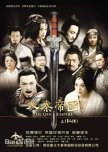
Divide and conquer.
Qin Empire 2 or Qin Alliance on Netflix is about Ying Si or King Huiwen of Qin who reigned from 338-311 BC. More than a century later, Ying Zheng or Qin Shihuangdi succeeded in unifying the Warring States(221 BC). In an interesting parallel, Ying Si was the first of the Dukes of Qin to name himself 王/Wang or King. His more well known descendent subsequently declared himself 皇帝/Huangdi or Emperor. I watched this out of order after completing Qin Dynasty Epic, which is Ying Zheng's story and the final installation of this four part series that doesn't have to be watched in order. This review is going to be short as there is an excellent comprehensive review by @Skibbies. I will try to avoid repetition and focus on incremental observations, especially on how this differs from the final season.What is most striking is that Ying Si really had it hard. When he came into power at eighteen, his father's clan and advisors were not fully behind him. And the Qin state was not especially powerful and existed in imminent danger of being swallowed by one of the other Warring States. Survival, much less ascendency was by no means a foregone conclusion. But Ying Si was a true conqueror - cunning, shrewd and utterly ferocious. Fu Dalong's masterful performance captures the remarkable indomitable spirit of the character and the sheer enormity and necessity of the task in front of him. This makes Ying Zheng, though so much more renown in history, seem like a lesser conqueror by comparison. For by then, Qin was already a superpower where the outcome was already inevitable.
The best parts of this drama are about how with the aid of his advisor and lifelong friend Zhang Yi, Ying Si was able to prevent five states from forming an alliance against Qin. They did this by some brilliantly crafted divide and conquer strategies that involved trickery, diplomacy and outright brutal and bloody warfare. Even though I was moved by Ying Si's deep relationship with Zhang Yi, I detested all of the so called genius strategists in this show, including Zhang Yi. I just could not stand their arrogance and sense of intellectual snobbery and how vile and evil these turds of history were. Their loyalty is not to king and country but can be bought by whoever could give them the most chess pieces to play with with little respect for the sanctity of life. To them, war is just a giant chess board where they can showcase their talent to the world. In the end Ying Si prevailed over all of them not because Zhang Yi was smarter or more loyal but because for Ying Si it was a battle for survival won by blood and sacrifice. His army would have gone to the ends of the earth for him because even while he took them to victory and glory, he truly felt the loss of and grieved for his fallen soldiers.
Even though I am sure it is heavily romanticized, I loved the portrayal of Ying Si's passionate and tempestuous relationship with the wild and wanton Empress Mi. What a woman! She lived life large, loved and hated and was at the end the bravest most loyal custodian of Ying Si's legacy. The drama lost momentum for me after Ying Si's death but the final two episodes where Empress Mi was both ruthless and compassionate at the same time ends this on a strong note.
While this production looks dated and lacks the aesthetic and cinematic appeal compared to more recent historical dramas, the acting of the main characters is top notch. The telling of the story overall, especially in the art of war is well done, not overly complex or difficult to follow. I could have done without knowing so much about Zhang Yi's personal life but there were some decent moments. This an 8.5 for me largely because I cannot praise enough how Fu Dalong's Ying Si is unforgettable and everything a Qin conqueror should be.
Esta resenha foi útil para você?

Death Proof.
This is a good but very dark comedy, one that I am pleasantly surprised to see in a Chinese production. Although with some modification, this is an obvious knock off of a fantastic but much darker Western production that many are likely to be familiar with. I don't have a huge problem with that and must applaud the effort to localise the story and tone it down for Chinese audiences. That said, it is an incredibly dark theme and at times the macabre gallows humor accentuates rather than distracts from the underlying despondency.Mi Chong is an introverted, anti-social young man who can just no longer be bothered to live. He meticulously winds up his affairs and plans his exit but is rudely interrupted by a drowning girl, Zhi Liao. Zhi Liao is his polar opposite, a bad-ass, extroverted and rebellious girl who is nothing but trouble. As he gets reluctantly drawn into her affairs, the hapless Mi Chong cannot seem to be able depart in peace; all of his efforts to do away with himself are comically disrupted. As he gets swept up in a whirlwind of danger and whacky mis-adventures that seem to plague Zhi Liao, he begins to wonder if he suddenly became death proof. While they go on the run together, this unlikely couple starts to recognise they are each other's mutual salvation. As their enemies encircle them, is the final irony that Mi Chong ends up fighting to save his life rather than end it?
Most of the time the whacky plot hits the right notes in terms of dark humor, irony and quirkiness. That said, there were also many times I found nothing funny about the depth of Mi Chong's despair and I am surprised something this dark got pass censorship. And I was not satisfied that Zhi Liao does not have the slightest inkling what Mi Chong was going through. It is a big flaw in the relationship design, the fact that she never comes to appreciate how disturbed he was. While the actress Vivienne Tien did a good job overall, she overacted notably in the ending arc and her rage and anger failed to move me. Although it became clear that they grew to trust and rely on each other, the chemistry between the couple didn't change enough to convince me that the dynamics turned romantic. The surrounding cast was unexceptional with some cringe performances, notably Zhi Liao's brother. This is clearly a modest production but overall a uniquely enjoyable, quirky short watch.
My rating for this is a 7.5 for a delightful attempt at dark comedy. It still has rough edges and the wit and humor in places veers too far off to the slapstick and does not match the wit, audacity and sheer magic of the drama it obviously drew its inspiration from. Where it does exceed it is that it closes with a very positive message about life, how it should be lived and how not to let the past define the future.
Esta resenha foi útil para você?
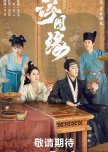
Missing parts.
Let me preface this review with a warning - this is a well-loved drama that I simply fail to appreciate. If my criticism of it will offend you or ruin the joy you found in it, best give this a skip.The soundbites are tantalizing: a taboo romance between a eunuch and a concubine; a ruthless and scheming male lead; a spirited and clever female lead; and palace conspiracies and mysteries aplenty. Not to mention Wang Hedi's Xiao Duo exudes that intense tall, dark, and dangerous kind of sex appeal that screams he is no Lord Varys. So I jumped in despite my reservations over Chen Yuqi's acting. As it turns out, that is one of the drama's lesser problems.
This drama is an inane attempt at dark satire aimed at the obscene privilege of emperors. It opens with the shockingly cruel practice of sending off childless concubines, known as tribute ladies to accompany the emperor in the afterlife. After high powered eunuch Xiao Duo rescues Bu Yinlou from this dastardly fate, an alliance of sorts forms between the two as they navigate treacherous palace politics in a time of power transition. I like how it was just a mutually beneficial relationship initially and how they disliked and were wary of each other; that the romance did not blossom instantly. Where it falters is in showing me why the two most powerful men in the palace connect with and fall so utterly for a woman afflicted by bizarre facial paroxysms.
Xiao Duo's wicked ruthlessness is gleefully conveyed with wit, panache, and flawless comedic timing by Wang Hedi. This is well matched by Peter Ho's slightly over-the-top portrayal of the deceptively simplistic, cartoonish-ly obsessive, and delusional emperor. Both portrayals convey each character's underlying ethos; a past sadness and secret loneliness. Unfortunately, Chen Yuqi’s jarring and tacky comedic interpretation is far more typical of a slapstick comedy than dark satire. Her exaggerated rapid eye movement and outlandish facial expressions had me triple-checking the synopsis to see if the character is supposed to be epileptic, schizophrenic, or simply possessed. While a huge upgrade from her usual vacuous sleepwalking, for the first 14 episodes, there is little beyond brazen tasteless humor in Chen Yuqi's Bu Yinlou. After that, she gets into character and delivers some really good scenes. She has good romantic chemistry with Wang Hedi that elevates her performance and the more serious tone the story takes also helps. But her acting is not consistent and wobbles again at the ending episodes. It highlights her limited range and is quite inexcusable for someone who is an acting school graduate with a long list of drama lead role credits. This is the best I have seen from her in years but that says nothing at all.
This drama's biggest issue is that it is missing a good plot. The storyline is contrived, naive and so ridiculous it is disdainful of audience intelligence. The writer's ignorance and superficial understanding of feudal imperial inner palace workings are embarrassing. It is impossible for someone like Bu Yinlou to waltz in and out of the inner palace like it is a hotel, live at a brothel and gallivant all over the kingdom with Xiao Duo. The production leaked "cut" romantic scenes like a sieve, trying to blame the abysmal failure in storytelling on censorship. The truth is all the kiss scenes in the world cannot salvage the messy plot and inconsistent characterizations. We are told both leads are smart characters but they are actually the architects of their own troubles. The allegedly Machiavelli Xiao Duo wrests the crown prince from the custody of the one person with the highest incentive to keep him alive and healthy and puts him in the hands of the person with the strongest incentive to kill him dead! As a couple, they have repeated opportunities to escape, but choose not to. Xiao Duo's revenge is anti-climatic and hastily swept under the rug once the killer is uncovered. They flaunt their affair with such reckless impunity they so deserved to get busted. I stopped caring if they ended up together and sat on the meh ending episode for weeks. I finally finished watching this so you don't have to. To my dismay, they got an ending they didn't earn or deserve.
The bottom line is Wang Hedi is the only reason to watch this drama. He is sexy even when he glowers and scowls and his costuming and visuals in this drama are swoon-worthy. In fact, save yourself some time and just watch all the fan-made videos of the romantic scenes hard-core fans have stitched together. You can skip all the rest because as foreshadowed by the eunuch theme, this drama has critical missing parts. I can only rate it 6.5/10.0 to finish at the rock bottom of my completed list for 2022.
Esta resenha foi útil para você?

Today is a good day to die.
Xu Tian, the young scion of a wealthy Southeast Asian family, is on his way to Shanghai to meet his fiancee for the first time. Set in 1930, his journey takes him from Guangdong through Jiangxi and Zhejiang; lawless territory controlled by local warlords. This is a road drama where the journey is an analogy for Xu Tian's personal growth and how this perilous trip makes a man of him. He is aided and inspired by five eccentric jianghu characters - a hot-blooded revolutionary, an idealistic warlord in a gilded cage, a romantic gambler, a passive aggressive doctor and a bourgeois wheeler and dealer. As they cut a bloody path to Shanghai, Xu Tian learns that actions have consequences; to live in the moment; that luck can change; that family must be protected and that money can buy access to all sorts of people and things.This is the fist time I have seen a Chinese drama attempt this kind of bizarre, absurd and violent black comedy where a small event, in this case a purloined wallet spirals out of control and snowballs into a series of violent, unpredictible and bloody encounters. All of Xu Tian's companions along the way have distinctive personalities and temperaments that make them the main character in their own stories. They are wierd, flawed, obssessive characters that are at surface triggered by bizzare and seemingly trivial events that are actually profound and hopelessly romantic upon deeper reflection. When triggered, they become raging bloodthirsty lunatics with a "today is a good day to die" kind of reckless fearlessness and determination. The ethos and irony is captured and diffused by the crisp, darkly comedic dialogue that builds both anticipation and fear as the story careens down a volatile and unpredictible path.
This cast list is like the who's who of top Chinese actors, starting with Liao Fan as Lao Sun. His opening arc is the one that made me experience shock, awe, rage and sorrow at man's reckless, absurd, obstinacy and obsessiveness. This was a tough act to follow and Zhang Luyi fumbles a bit in his portrayal of Yu Yixiu, who is by design a fascinating paradoxically powerful and helpless character. Thus the second arc sags somewhat but gets shored up somewhat by Wu Xiaoliang's short and moving portrayal of the lovestruck gambling addict. The drama gallops on to a thrilling finish when Zhang Yi's obsequious, passive aggresive doctor teams up with Tian Yu's explosive, trigger happy capitalist for the final showdown. I also have much praise for Zhang Jingwei's fanatically dogged Ma Tianfang, Song Hanhuan's mercilessly ambitious Wu Da and Qiu Tian's passionately misguided Jia Ruo Lan.
Unfortunately the cast's impeccable performances all around is weighed down by the leading role, Dong Zijian's Xu Tian. He is an excellent actor but this was a big step down from his other works. Maybe he was simply out classed by the stellar cast but I think more likely, he was just mis-cast in this role. I didn't like his Xu Tian at all and was not moved by and did not empathize with the character. If the journey made him smarter or stronger, it did not come across; he just seemed just as belligerent, more vicious and just as obdurate. I frankly didn't care whether or not he made it to Shanghai and couldn't believe so many risked all to help him along the way. I even cared more for the petty villains and the poor bystanders that were collateral damage than I did for Xu Tian. This drama made me laugh as hard as I cried and I was unbecomingly thrilled by every dark, sick, ironic twist the narrative took. But when I can barely root for the main character over the villain, I must only rate this an 8.5/10.0. That said, it is still a mind-blowing and incredible adventure, especially if you like dark comedy.
Esta resenha foi útil para você?

Sweet with a bitter aftertaste.
Love of Nirvana or The Flowing Water 流水迢迢 is a deep, dark, intricate and impactful drama about politics, revenge, love and freedom. The plot and characters are three dimensional and the love story unfolds within the complex dynamics of multiple conspiracies and an uneven battle for justice and freedom. Jiang Ci is a free spirited country girl seeking adventure in the Liang capital Qingkang for the first time. She climbs the wrong tree at the wrong time to watch peace talks between the Liang and Wei states and inadvertently foils a dangerous, high stakes mission. Stabbed and then hunted down by a masked intruder who believes she may be able to identify him, she is rescued by the ambitious Marquis Pei Yan. He uses her as bait to lure and capture the masked prowler. Thus a clever and free spirited country girl becomes the pawn of two ruthless men and becomes embroiled in a diabolical conspiracy that oppressed and enslaved the Yueluo people. All of the characters in this story, including the almighty emperor, get to choose their own destiny but not their fate. Like the flowing water that may be momentarily grasped or diverted, fate is ultimately elusive and flows where it will.This is one of the those dramas where the storytelling respects audience intelligence and perceptiveness. There is very little spoon-feeding or over explanation; we are expected to read the subtext and form our own impressions of what the characters are going through. At the start, I was rooting for Jiang Ci to skin Wei Zhao alive and flaunt his fur like a trophy for the way he treated her. And then with a growing sense of unease that turned into horror, I started to observe the plight of the Yueluo people and the scale of the collective punishment that was being visited upon them. At that point, the narrative angle shifts from Jiang Ci to Wei Zhao and like Jiang Ci, we see his devastating sense of isolation and helplessness; that he alone bears burden of his father's villainy.Jiang Ci's inadvertent and continued meddling had life and death consequences for his men and his cause. Of course he had to deal harshly with her. Jiang Ci doesn't just fall in love with a man, she falls in love with a place and a people who are slowly but surely being erased by Liang's genocidal policies. Their evolution from enemies to lovers is gradual, natural and convincing.
All of the main roles are well portrayed, with the actors conveying multiple layers to their characters via their facial expressions and gestures that goes beyond the dialogue. Ren Jialun is not that versatile an actor but Wei Zhao is the kind of complex, man of few words role that he excels at. With a flicker of an eye, a small frown or a dark glare, he can exude emotions from frustration and anger to sorrow and dismay. The way he regards Jiang Ci changes from rage and hatred to grudging respect and empathy to Ren Jialun's signature bottomless longing. Wei Zhao never dares speaks of the future, it is Jiang Ci who simply refuses to let him pull away. He understands she is a free spirit and his selfless instinct is to set her free in sharp contrast with Pei Yan's selfish obsessiveness and his repeated attempts to cage her. Li Landi's Jiang Ci steps up to the plate to more than meet Wei Zhao halfway. I love how she so unabashedly gushes over how handsome he is and freely expresses her affection for him. Even though the noble Pei Yan has arguably more to offer, she chooses Wei Zhao unconditionally each time. Their sweet loving lies, their body language and the dialogue within their dialogue made me tear up many times.
No one has an upper hand in this story because characters are too clever and adept at pre-empting one another. Xu Zhengxi delivers a evocative portrayal of the brilliant, ambitious, manipulative and controlling Pei Yan. If this role is to be his swan song, it is one that leaves an impression. His ambition and obsessiveness are amplified and exceeded by his mother, the domineering Madame Rongguo; another riveting depiction by the super talented Wen Zhengrong. Unfortunately all of these fantastic characters are dealt a huge disservice in the penultimate arc, where we meet shifu, the only truly stupid and pointless character in this story. All of hitherto smart characters are dumbed down by one or two notches for an unnecessary court power struggle arc and melodrama. Madame Rongguo's overreach was futile and unnecessary and Pei Yan's selfishness had irreversible consequences. Only the wise and constant Cui Liang's character survived that arc that was clearly written by an amateur.
The narrative comes together again for a triumphant, exciting and moving final arc. Fate is blind and the taste of freedom is sweet with a bitter aftertaste. Nobody gets everything that they want but the greater good is achieved at great cost. However, not all the individual outcomes were inevitable and the ending itself could have been more tightly written. It appeared as if they were on the verge of a different, more satisfying ending but didn't have the courage to go there. I will elaborate further on that in a spoiler below. All things considered, this is still one of the better, more memorable period costume dramas this year with a complex and moving plot and outstanding acting. Despite the flaws, it is a story that has enough depth that I am compelled to rate this generously at 8.5/10.0.
ENDING SPOILER
My biggest problem with the ending is that Wei Zhao chose to stay when he could have escaped and left the hairpin behind as evidence that Wei Zhao died and returned to Jiang Ci as Xiao Wuxia. It is clear from the ending footage that they toyed with a "traitorous official Wei Zhao is dead, long live Xiao Wuxia" ending but decided to stay true to the novel. I would have been fine with that if they just blew up the whole thing and didn't give him a choice. The fact that he had one broke me; it was out of character and a betrayal of Jiang Ci. It also made no sense since was never revealed that Wei Zhao is Xiao Wuxia and thus Wei Zhao's actions should not implicate the Yueluo people. It was just dumb and unnecessary noble idiocy. Even though it is a happy ending for Yueluo, it is simply too distressing an outcome for both Xiao Wuxia and Jiang Ci, who deserve better. It would have been just as fitting and much more satisfying for Wei Zhao's memory to live on in infamy while Xiao Wuxia and Jiangci live wild and free with their son even if they can never return to Yueluo. That is how I would have ended this story.
A smaller point, I also hated the maudlin farewell scene. Throughout the show Jiang Ci and Wei Zhao's feelings did not have to be put into words. I wish they kept it that way.
X
Esta resenha foi útil para você?
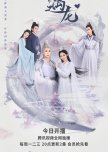
Which asshole wrote this script?
That was the best line in Miss the Dragon, a xianxia that just misses the boat. It is a thought that jumps to mind at various points of the drama. The writer must be someone with both self awareness and a sense of humor. Which you must have plenty of if you choose to watch this because it can be so ridiculous and silly that you almost have to just laugh at it.The story opens with the injured dragon king Yuchi Longyan rescued by a maid Liu Ying who mistakes him for a common snake. Liu Ying rescues injured animals, including the bird elf Qingqing while she daydreams about the mythical dragon king. The first arc is largely an amalgamation of the best moments of other hit xianxias, notably TMOPB. When it comes to recycling other drama's memorable moments, it best be either a really clever parody or a vastly superior moment. In this case it is neither. Some of the writer's own original humor is fresh and funny enough they should have just gone with that and focused on fleshing out the main couple and getting us invested in their relationship. Instead, after being vividly reminded of some old favorites, I am left with the impression of two rather blank characters whose shallow infatuation with each other was unlikely to last until supper time, forget several lifetimes.
While Liu Ying does get a tad more interesting with each subsequent lifetime, there is little of substance that survives each incarnation. So it is not clear what Yuchi Longyan is fighting for, what is innately so special about Liu Ying that the dragon king loves so much. Zhu Xudan did a good job essentially playing four different characters but she is wasted in these sappy rather simple roles that any newbie actress can play. As for Wang Hedi, after a delectable opening scene of him emerging scantily clad from the dragon pool, I was left with an indelible impression of an overdressed plank. His portrayal of the dragon king is an impressive study of the art of being bizarrely still and plank like while everything else is moving. At first, I thought he was accidentally sent the script from a botox commercial. Then I started to feel insecure about accidentally hitting pause on my remote. Bottom line, I didn't feel any spark between the leads. Oddly, his interactions with all of the other characters are so much more natural and enjoyable. I rarely comment on the OST and the BGM but in this case I must point out it was good enough to make me tear up much more than was induced by the acting or story during the sad moments.
The idea of a love that transcends lifetimes is very powerful and moving but that concept is much more originally and engagingly explored in the second couple's story. Indeed the love story between the block of burning ice that is Xue Qianxun the master of Luofeng Pavilion and his flighty chirpy little bird elf Qingqing is why I didn't drop this drama. Both characters are better developed and they have understandable motives and goals. Their relationship is so humorous and their chemistry builds so organically that I had to root for them and was intrigued by and impatient to discover their past. I won't spoil it by saying more than that is a wonderful and memorable mini fairytale in and of itself and that is what the focus of this drama could and should have been.
The way the drama ends goes a long way to redeem itself. I really ate up the epic magical battles and even though the villain is quite lame and was obvious to me from the beginning, I like how all the pieces of their scheming is revealed and how it all ties in quite neatly with the plot and the many lives of Liu Ying. I am solidly in the camp of really liking the ending; anyone who knows the legend of Nuwa would not be that surprised by it. Overall its not a bad watch, it has quite some entertaining moments beyond just laughing at the production. My rating gets a bump up to a 7.0/7.5 due to the wonderful second couple and ending at the climax.
Esta resenha foi útil para você?


 54
54 201
201 8
8



















